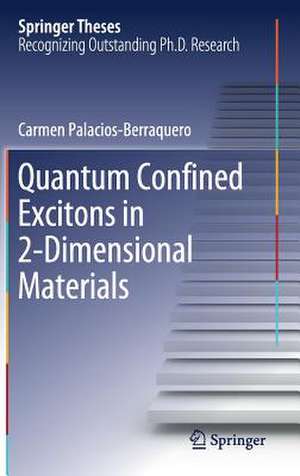Quantum Confined Excitons in 2-Dimensional Materials: Springer Theses
Autor Carmen Palacios-Berraqueroen Limba Engleză Hardback – 13 noi 2018
Din seria Springer Theses
- 18%
 Preț: 997.88 lei
Preț: 997.88 lei -
 Preț: 389.88 lei
Preț: 389.88 lei - 15%
 Preț: 646.94 lei
Preț: 646.94 lei - 18%
 Preț: 943.43 lei
Preț: 943.43 lei -
 Preț: 399.29 lei
Preț: 399.29 lei - 18%
 Preț: 944.99 lei
Preț: 944.99 lei - 15%
 Preț: 636.80 lei
Preț: 636.80 lei - 18%
 Preț: 941.05 lei
Preț: 941.05 lei - 15%
 Preț: 643.16 lei
Preț: 643.16 lei - 15%
 Preț: 642.68 lei
Preț: 642.68 lei - 18%
 Preț: 1103.62 lei
Preț: 1103.62 lei - 20%
 Preț: 558.83 lei
Preț: 558.83 lei - 18%
 Preț: 1112.30 lei
Preț: 1112.30 lei - 18%
 Preț: 944.19 lei
Preț: 944.19 lei - 18%
 Preț: 1109.92 lei
Preț: 1109.92 lei - 18%
 Preț: 1217.27 lei
Preț: 1217.27 lei - 15%
 Preț: 640.06 lei
Preț: 640.06 lei - 15%
 Preț: 636.45 lei
Preț: 636.45 lei - 15%
 Preț: 640.06 lei
Preț: 640.06 lei - 15%
 Preț: 640.88 lei
Preț: 640.88 lei -
 Preț: 389.70 lei
Preț: 389.70 lei - 20%
 Preț: 563.91 lei
Preț: 563.91 lei -
 Preț: 393.35 lei
Preț: 393.35 lei - 15%
 Preț: 637.93 lei
Preț: 637.93 lei - 15%
 Preț: 641.85 lei
Preț: 641.85 lei - 18%
 Preț: 1225.94 lei
Preț: 1225.94 lei - 20%
 Preț: 551.36 lei
Preț: 551.36 lei - 18%
 Preț: 1229.10 lei
Preț: 1229.10 lei - 15%
 Preț: 639.25 lei
Preț: 639.25 lei - 18%
 Preț: 999.45 lei
Preț: 999.45 lei - 15%
 Preț: 640.06 lei
Preț: 640.06 lei - 18%
 Preț: 1220.45 lei
Preț: 1220.45 lei - 18%
 Preț: 1116.26 lei
Preț: 1116.26 lei - 18%
 Preț: 1110.72 lei
Preț: 1110.72 lei - 18%
 Preț: 1000.87 lei
Preț: 1000.87 lei - 18%
 Preț: 891.17 lei
Preț: 891.17 lei - 15%
 Preț: 640.06 lei
Preț: 640.06 lei - 5%
 Preț: 1154.07 lei
Preț: 1154.07 lei - 15%
 Preț: 635.96 lei
Preț: 635.96 lei - 15%
 Preț: 640.88 lei
Preț: 640.88 lei -
 Preț: 387.20 lei
Preț: 387.20 lei - 18%
 Preț: 1109.92 lei
Preț: 1109.92 lei -
 Preț: 385.25 lei
Preț: 385.25 lei -
 Preț: 385.25 lei
Preț: 385.25 lei - 18%
 Preț: 1112.30 lei
Preț: 1112.30 lei - 18%
 Preț: 999.45 lei
Preț: 999.45 lei -
 Preț: 386.99 lei
Preț: 386.99 lei - 15%
 Preț: 637.13 lei
Preț: 637.13 lei - 20%
 Preț: 554.21 lei
Preț: 554.21 lei - 20%
 Preț: 555.59 lei
Preț: 555.59 lei
Preț: 638.43 lei
Preț vechi: 751.10 lei
-15% Nou
Puncte Express: 958
Preț estimativ în valută:
122.16€ • 133.11$ • 102.94£
122.16€ • 133.11$ • 102.94£
Carte tipărită la comandă
Livrare economică 23 aprilie-07 mai
Preluare comenzi: 021 569.72.76
Specificații
ISBN-13: 9783030014810
ISBN-10: 3030014819
Pagini: 259
Ilustrații: XII, 116 p. 37 illus., 36 illus. in color.
Dimensiuni: 155 x 235 mm
Greutate: 0.36 kg
Ediția:1st ed. 2018
Editura: Springer International Publishing
Colecția Springer
Seria Springer Theses
Locul publicării:Cham, Switzerland
ISBN-10: 3030014819
Pagini: 259
Ilustrații: XII, 116 p. 37 illus., 36 illus. in color.
Dimensiuni: 155 x 235 mm
Greutate: 0.36 kg
Ediția:1st ed. 2018
Editura: Springer International Publishing
Colecția Springer
Seria Springer Theses
Locul publicării:Cham, Switzerland
Cuprins
Introduction.- 2D-Based Quantum Technologies.- Experimental Techniques.- Deterministic Arrays of Single-Photon Sources.- Atomically-Thin Quantum Light Emitting Diodes.- 2D Quantum Light-Matter Interfaces.- Conclusions and Outlook.
Notă biografică
Dr Carmen Palacios-Berraquero is a postdoctoral associate of the Cavendish Laboratory at the University of Cambridge. She is part of the Quantum Information and Nanoscale Metrology group led by Mete Atatüre, where she carried out her PhD in the quantum optics of 2-dimensional semiconductors, pioneering the discovery of deterministic creation of quantum dots in these materials. She completed courses at the Nanotechnology Doctoral Training Centre (NanoDTC) in Cambridge. She received her MSci degree (First Class Honours) from Imperial College in London, during which she spent a year at ESPCI Paris Tech. In 2018 Carmen received the prestigious “Jocelyn Burnell Medal” awarded by the Institute of Physics.
Textul de pe ultima copertă
This book presents the first established experimental results of an emergent field: 2-dimensional materials as platforms for quantum technologies, specifically through the optics of quantum-confined excitons. It also provides an extensive review of the literature from a number of disciplines that informed the research, and introduces the materials of focus – 2d Transition Metal Dichalcogenides (2d-TMDs) – in detail, discussing electronic and chemical structure, excitonic behaviour and response to strain. This is followed by a brief overview of quantum information technologies, including concepts such as single-photon sources and quantum networks. The methods chapter addresses quantum optics techniques and 2d-material processing, while the results section shows the development of a method to deterministically create quantum dots (QDs) in the 2d-TMDs, which can trap single-excitons; the fabrication of atomically thin quantum light-emitting diodes to induce all-electrical single-photon emission from the QDs, and lastly, the use of devices to controllably trap single-spins in the QDs –the first step towards their use as optically-addressable matter qubits.
Caracteristici
Nominated as an outstanding Ph.D thesis by the University of Cambridge, Cambridge, UK Provides a first-hand account of the first successful experiments in the field, some of which are already being replicated in labs around the world Presents a detailed, comprehensive, and insightful review of the many disciplines informing the research
